A multivitamin for women over 50 is formulated to address the changing nutritional needs of older women.
Multivitamins are particularly important for 50+ women because, as the body ages, it can lose the ability to absorb enough nutrients from food, or require more than before. Multivitamins can help fill the resulting nutrient gaps.
With so many multivitamins on the market today, sifting through them all is no small task. But fear not. We’ve done the heavy lifting for you. Here are the best multivitamins for women over 50 of 2023.
Rankings
1. Ritual Essential for Women 50+
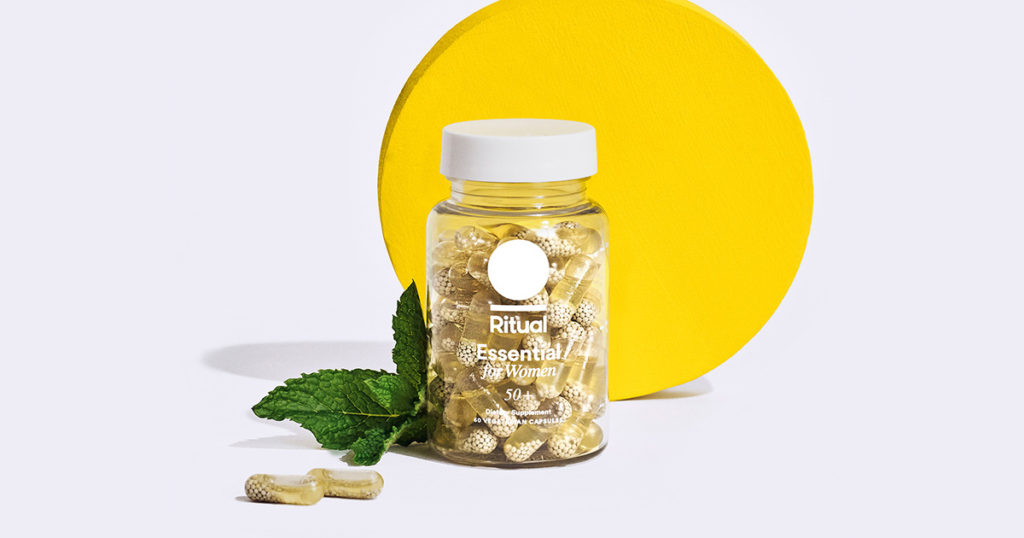
Ritual Essential for Women 50+ is specifically formulated to help women over the age of 50. Delayed-release capsules are designed to dissolve in the small intestine, an ideal place to absorb nutrients.
What we like: This incredible (and reimagined) multivitamin was designed for women post-menopause with nutrients to support healthy aging from within, especially bones. Each pill is stacked with these 8 essential ingredients:
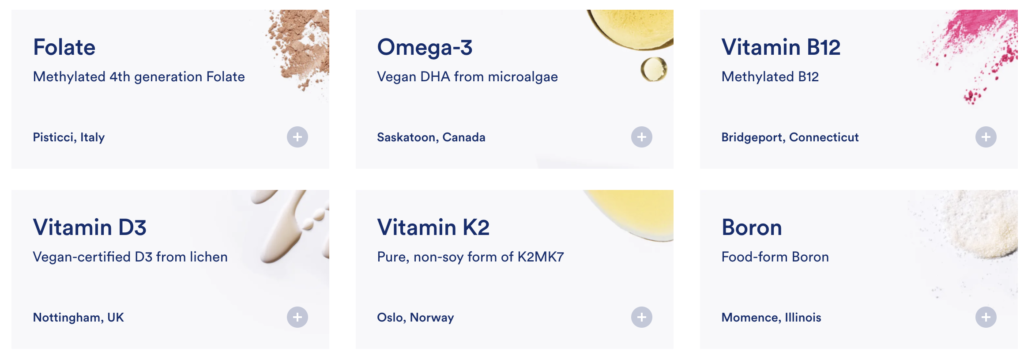
Flaws: The “premium” multivitamin comes with a higher-than-average cost and can be a downside for some people.
2. Nature’s Way Alive! Women’s 50+ Multivitamin
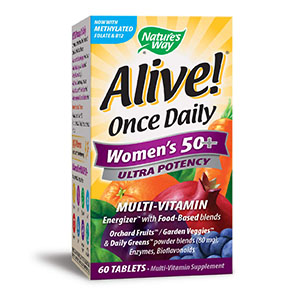
Click here for the lowest price on Amazon
Nature’s Way snags a spot on our list with their Alive! Women’s 50+ Multivitamin. There are a lot of things to like about this multi, including the digestive enzymes. There’s also cranberry extract that promotes urinary tract health.
What we like: We like the impressive array of vitamins and complementary minerals provided. We appreciate that they offer a wide variety of plant materials and digestive enzymes. It’s great that they provide nutrients through a whole foods-based formula that provides more than just vitamins and minerals, like enzymes, antioxidants and phytochemicals. It’s also a plus that you get what you need in a single daily tablet.
Flaws: Calcium is low at 15% and each tablet does contain some additives. The pill is also large. You might have to cut it in half to get it down.
3. Enzymedica, Enzyme Nutrition Women’s 50+
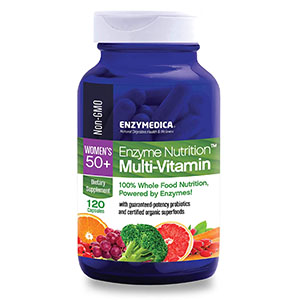
Click here for the lowest price on Amazon
Enzymedica emphasizes the role digestive enzymes play in overall health. But they don’t ignore the fact that, even with a healthy gut biota, older women can still use some supplemental help. So there’s plenty of vitamins A, C, D, and E.
What we like: This is a high quality, unadulterated product that emphasizes digestive health. Also, they don’t skimp on the variety of vitamins or minerals, and include several botanicals like goji berry and broccoli extract.
Flaws: They recommend you take 4 capsules a day. That’s a lot of big vitamin capsules to swallow.
4. Centrum Silver Women’s 50+ Multivitamin
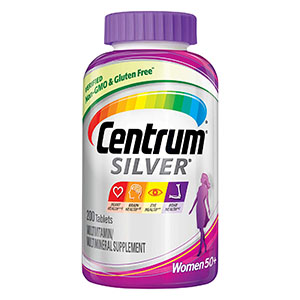
Click here for the lowest price on Amazon
Centrum Silver has been around for decades and is likely the best-known brand of multis for older individuals. Their Women’s 50+ is rich in vitamins A, C, E, and D. It also provides plenty of B12 for mind and immune system support, and doesn’t forget the calcium and magnesium.
What we like: There’s plenty of vitamin D for bone health and antioxidant vitamins (A and E) to combat free radicals. Also, none of the vitamins or minerals here come from genetically modified organisms.
Flaws: Once again, the most common complaint is that they’re too big for their target demographic to swallow easily.
5. Rainbow Light – 50+ Mini-Tablet
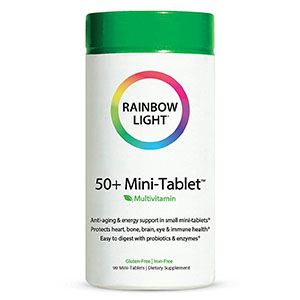
Click here for the lowest price on Amazon
This Mini-Tablet from Rainbow Light fits the bill for a comprehensive supplement. There’s enzymes, antioxidant-rich plants, and a wide range of nutrients, including vitamin D along with calcium and magnesium. And the antioxidant vitamins so crucial to health later in life are also well represented.
What we like: Rainbow Light checks all the right vitamin and mineral boxes. They provide a generous supply of probiotics to encourage a healthy gut flora. That, in turn, aids digestion. These are highly pure, high-quality tablets completely free of GMOs and common food allergens.
Flaws: The tablets are not as small as the word ‘mini’ implies. Also, folate and B12 are not in methylated forms.
6. MegaFood, Multi for Women 55+
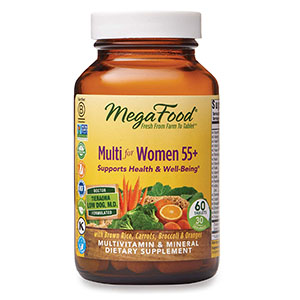
Click here for the lowest price on Amazon
MegaFood sources all of their nutrients from whole, organic foods. They also avoid GMOs and common food allergens like gluten. What you get here are unadulterated nutrients in an easy to swallow capsule.
What we like: We like that they are made with real food and not just synthesized in the lab. We appreciate the 1000mg of vitamin D, which helps enhance calcium absorption and strengthen bones, as well as the methylated B-vitamins and added green tea extract. We also like that there’s no iron.
Flaws: Although they’re pretty expensive there are no extras such as omega-3’s, plant material, probiotics or enzymes.
7. One A Day Women’s 50+ Healthy Advantage
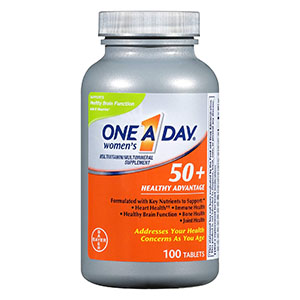
Click here for the lowest price on Amazon
One-a-Day Women’s 50+ skips on the probiotics but goes all-in on the vitamins and minerals essential to an older woman’s health. In fact, 100% of 15 nutrients are provided, including plenty of B vitamins to promote immune system health and cognitive function, and 1000mg of vitamin D to enhance calcium absorption and help strengthen bones.
What we like: This supplement emphasizes strengthening bones and keeping you mentally sharp. It also bolsters eye and skin health and strengthens the immune system. And it’s free of common allergens, contains no iron, and provides moderate doses of nutrients without going too high.
Flaws: If you have a sensitive stomach and take them without food, they may cause a bit of indigestion. Fillers and binders are present and many of the nutrients appear to be in synthetic form though most do not specify active form.
8. Garden of Life Vitamin Code Multivitamin for Women
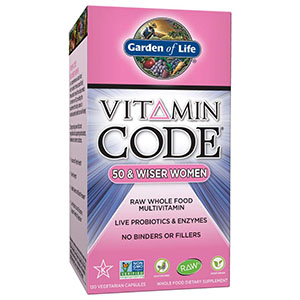
Click here for the lowest price on Amazon
Garden of Life has a well-earned reputation for excellence that extends to all of their vitamin and mineral supplements. They take extra trouble to find reliable, non-GMO sources for their nutrients and never mess things up with artificial ingredients are allergens.
What we like: We like the blend of vitamins, minerals, enzymes, and probiotic cultures. We appreciate the large doses of vitamins A, C, D, and E. And there’s plenty of B12 to help keep you mentally sharp and aid in red blood cell production. Many bone-supporting micronutrients are also included like boron, manganese, zinc and vitamin K2. Third-party testing also ensures product quality.
Flaws: Calcium and magnesium are not included. Also, 4 capsules per day is a lot to swallow.
9. New Chapter Women’s Multivitamin
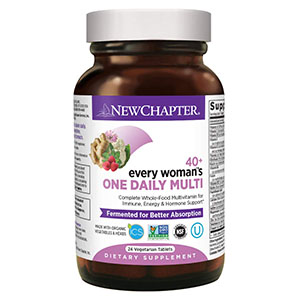
Click here for the lowest price on Amazon
Some dieticians swear by fermented vitamins. And while the scientific jury is out on whether they are the be-all-end-all some consider them, there is little debate that they are effective and easy to digest. Both of those qualities make New Chapter Women’s Multivitamin a win-win.
What we like: We appreciate the breadth of provided nutrients, with amounts aimed to meet a woman’s daily need without excessive percentages. The fact that the vitamins are fermented should (in theory anyway) make them easier on the stomach. Similar to Garden of Life’s Vitamin Code above, glutathione and superoxide dismutase are included for immune health and antioxidant support. Bonus that all this fits into 1 daily tablet!
Flaws: B12 is not in its methylated form and it is a lower amount (415%) than most other multivitamins (500-3400%).
10. MultiFactors by Natural Factors
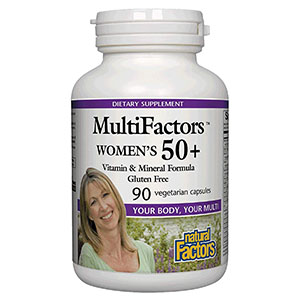
Click here for the lowest price on Amazon
Natural Factors MultiFactors multivitamin is a well-rounded supplement that leaves no nutritional stone unturned. From antioxidants to calcium to vitamin B12 for your mind, this is a full-service multi in an easy to swallow capsule.
What we like: We like that they provide more than three dozen vitamins, minerals, and enzymes in every capsule. We’re glad to see the emphasis on antioxidants and botanicals.
Flaws: The probiotic component is relatively spare. Also, better hope you don’t have a problem because customer support can be an issue. The vitamin E content is very high (667%) which may increase cancer risk in those who have a history of smoking. The iodine content is also very elevated (333%) which can be problematic for those with thyroid disorders.
11. 21st Century Sentry Senior Women 50 Plus
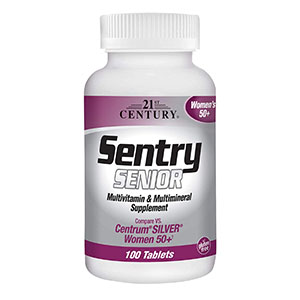
Click here for the lowest price on Amazon
21st Century Sentry Senior provides an impressive array of vitamins and minerals in moderate doses to meet nutrient needs without overdoing it. Their remarkable price point also makes them a smart choice for budget-conscious women.
What we like: We appreciate that they stack up well against better known (and more expensive) brand names. We like that all of this nutrition is packed into a single daily tablet. And what can we say about the price? Pretty amazing.
Flaws: This brand contains fillers, binders and artificial additives. It also contains iron, but does not contain any probiotics, enzymes, or botanicals to aid in digestion.
Do Women Over 50 Need Multivitamins?
There are a lot of conflicting opinions when it comes to multivitamins. If you look at the evidence, you’ll find plenty of research that questions their effectiveness and safety (1). On the other hand, doctors continually prescribe various vitamins and minerals to their patients to tackle a range of problems, including anemia and osteoporosis.
Osteoporosis is a condition of particular concern for women over 50. And the National Osteoporosis Foundation recommends taking calcium supplements to help, but only when your diet is deficient in calcium (2). At the same time calcium can’t do its job building and protecting your bones if you don’t get enough vitamin D (3). So even if you don’t need supplemental calcium, make sure your multivitamin supplement contains vitamin D.
So the answer to the question ‘Do women over 50 need multivitamins?’ is ‘it depends’. Smokers and those with a history of smoking may have a higher risk of cancer when supplementing with vitamin A and vitamin E so supplement with caution (4). Certainly, vitamins and minerals play important roles in maintaining health but obtaining those through food first is ideal. Plan to supplement to cover missing gaps rather than taking extra which doesn’t appear to be a good strategy for long-term health. Calcium, vitamin D, magnesium, vitamin C, omega-3 fats, vitamin C, botanical extracts, and others nutrient may be warranted in supplement form to improve the aging process.
As far as other vitamins and minerals are concerned, they may very well help fill nutritional gaps in older women created by poor diet, illness, or even medications (5),(6).
How We Ranked
It’s a given that multivitamins are not the answer to all the potential health problems a woman over 50 can or will encounter. Instead, their job is to supplement a woman’s diet, address nutritional shortfalls and, in some cases, address specific health threats. So when we look at multivitamins for women over 50, we want them to have the vitamins we mentioned above. We also want them to offer a host of other vitamins that are potentially helpful in filling nutrient gaps.
Also, we prefer if the multivitamins offer complementary minerals. As we mentioned, vitamin D and calcium work together. Vitamin B12 and folate also should be included to help prevent anemia (7). So if a supplement offers these kinds of complementary vitamin/mineral pairs, we like that. Magnesium is another mineral that’s important for older women since it can further support bone health and promote relaxation. We also looked at nutrients that compete for absorption such as copper and iron and gave more weight to supplements that respected these interactions.
Beyond the nutritional details, we chose companies that produce their supplements in good manufacturing practices (GMP) facilities. We also prefer companies that understand the importance of accountability through third-party testing. Finally, we considered price due to those on fixed incomes. That said, if a particular supplement seemed worthy of making a financial stretch, we included it too.
FAQs
Q: Why do women over 50 need multivitamins?
A: As women age their nutritional requirements change. The foods that provided bountiful nutrition at a younger age may now be coming up short. Dietary habits that have been followed for years are tough to break. This is where multivitamins for women over 50 come in. A good multivitamin supplement will provide a balance of important nutrients formulated to address the specific requirements of older women. One example includes a need for more vitamin D, and other bone-supporting nutrients like phosphorus, vitamin K2 and magnesium, to ensure healthy bones and reduce the risk of osteoporosis.
Q: What minerals are important for a woman over 50?
A: Calcium is one of the most important minerals for women over 50. It helps prevent the onset of osteoporosis. For those with osteoporosis supplemental calcium can reduce the fragility of bones and thereby reduce the likelihood of a debilitating fracture (8). Magnesium deficiency raises the risk of type II diabetes, so supplemental magnesium is also a good idea.
Q: Should women over 50 take iron?
A: A lack of iron can contribute to iron-deficiency anemia and all the problems that come with it (9). However, since postmenopausal women are no longer losing iron via menstruation, it’s often recommended that they reduce the amount of iron they consume. That’s because iron is not a benign substance. Too much iron can cause damage to the liver, and other organs, and may be pro-inflammatory, excaberating digestive symptoms (10). Excessive iron may even promote the growth of cancerous tumors (11). As such, most health professionals encourage older women to get adequate levels of iron from the foods they eat and to forego supplemental iron unless there is a diagnosed need.
Q: What are probiotics and should women’s vitamins include them?
A: Digestive health plays a key role in overall health and wellbeing (12). Its importance becomes even more apparent as we age and our bodies tend to become less efficient at processing food. Probiotics (13) are bacteria that promote a healthy digestive tract. They play a huge role in our immune function and can even synthesize valuable nutrients. The benefits of probiotics are many (14), and they are readily available in foods like yogurt, pickles, kimchi, and miso soup. However, not everyone is fond of those particular foods and/or may not be consuming them daily. Fortunately, that’s not a problem because there are many supplements today, including multivitamins for women over 50, that contain probiotics and prebiotics (fuel for the probiotics) to help bridge the gap
Q: Can anyone take multivitamins for women over 50?
A: Usually, yes, but the nutrient levels won’t be quite as tailored to meet others’ needs. For example, a woman of child-bearing age benefits from higher intakes of folate in a prenatal vitamin which is not usually provided in other multivitamins. There are certainly plenty of vitamins (and sometimes minerals) in these supplements to provide a potential health benefit to just about anyone. Most, however, are specifically formulated to address the micronutrient requirements and/or disease risk of older women. Which, as we have seen, are different than those of men and young adults. Since osteoporosis affects four times as many women as it does men, men don’t need as much of the calcium that multivitamins for women over 50 typically provide.
Q: What are isoflavones?
A: Some vitamin supplements for older women contain isoflavones (15). Isoflavones are a type of plant compound (known as phytoestrogens) that exert estrogen-like properties and are commonly found in soy-based foods and products. Isoflavones have shown similar benefit to hormone replacement therapy in post-menopausal woman (16). So, while it’s likely most people could derive some benefit from taking multivitamins for women over 50, a better course of action is to find a multi more suited to your specific needs.
Q: What’s the best time of the day to take a multivitamin?
A: As is usually the case with dietary supplements, there is not really a ‘best’ time of the day to take multivitamins, though taking them with a meal can help increase absorption. The best way to ensure you don’t forget is to make them part of a particular daily routine. That might mean having one with your morning coffee or tea, having one with lunch, or making sure you have one with your evening meal. In some cases, the manufacturer will recommend taking two or more capsules per day. In that case, you may want to make taking a multivitamin part of your routine for several meals.
Q: Do multivitamins for women over 50 contain fiber?
A: In most cases multivitamins for women over 50 do not contain fiber. That’s not to say that fiber isn’t important for older women. It certainly is. But there’s a practical reason why fiber isn’t part of most multivitamins: it takes up lots of space. If fiber were added to multivitamins, it would make most of them extra large or increase the number of capsules or tablets required for the daily dose, or both. So, while fiber is important, it’s best if it comes from a separate, preferably dietary, source rather than from your multivitamin supplement.
Q: Are ‘expired’ multivitamins bad for you?
A: People often see the ‘expiration’ date on a bottle of vitamins and think it has some sort of scientific basis. The fact is the FDA does not require manufacturers to put an expiration date on their vitamins (17). Most companies do so simply to get people to buy more vitamins. The only possible objective danger posed by old vitamins past their ‘use by’ or ‘expiration’ date is the presence of mold.
Q: How do vitamins get moldy?
A: Vitamins get moldy by being stored in warm, damp conditions. This can promote the growth of mold on the capsules. In most cases, ingesting some mold won’t cause any problems. But if your immune system is in a weakened state, as may be the case with older individuals, mold may cause you to feel nauseaous (18). The important thing is not to let the multivitamins sit around long enough to get moldy. Take them every day as directed.
Q: Can multivitamins be taken with other medications?
A: Multivitamins can be taken with some medications. In other cases, they may impact the effectiveness of the medication, making it either more or less potent (19). This is true for both over the counter (OTC) medications like NSAIDs and antacids, as well as prescription drugs including antibiotics and blood pressure medications. If you are currently taking medications to treat a specific condition, you should discuss the matter with your primary care physician before taking multivitamins. As a general rule, the more ingredients in a supplement, the greater the odds it will produce a counterproductive reaction with medications.
Q: Can multivitamins reduce the risk of women dying from breast cancer?
A: Research suggests that multivitamins may significantly reduce the likelihood of an older woman dying from invasive breast cancer (20). Nearly 8,000 women between the ages of 50 and 79 with invasive breast cancer were closely followed for seven years. At the end of that time it was found that the death rate for those who took multivitamin supplements was 30 percent lower than those who didn’t take multivitamins. More research is needed to confirm this finding, but it’s a very encouraging result nonetheless.
Q: Should women over 50 take multivitamins with collagen?
A: Collagen is comprised of amino acids and is the most abundant protein the human body. It’s a vital component of bones, skin, cartilage and other tissues. As we age our bodies produce less and less collagen and that’s one reason our skin begins to sag and our bones become brittle. So, yes, women over 50 should not hesitate to take a multivitamin with collagen. It can help fend off some of the worst effects of aging and it has few, if any, side effects. Taking supplemental collagen can help reduce some of the effects of arthritis (21) and can help ensure that any cuts heal properly.
Q: Can I cut a multi in half if it’s too big to swallow?
A: You can cut a multivitamin tablet in half if you need to in order to swallow it. For that matter, you can also crush it or even chew it (if your teeth can handle it and you don’t mind the bitter taste). The potency of a vitamin tablet is not dependent on its shape. Cutting vitamins in half is a common practice for those who find a tablet too big to swallow easily. Just remember that cutting it in half may create a sharp edge along the cut line that could be uncomfortable going down. Also, tablets marketed as extended release or multivitamins in capsule form should not be cut.
Related Articles
Recap
Multivitamins for women over 50 can play a vital role in ensuring robust health well into old age. Regardless of what you may have heard about vitamins being ineffective, there is enough clinical evidence that supports the proposition that they can be instrumental in treating many conditions and preventing others from taking hold, when consumed in appropriate amounts.
With so many different formulations on the market today, there is bound to be one that will effectively address your needs. But if you have any questions regarding which is best for you, don’t hesitate to discuss it with your doctor first.
All of the multivitamins for women over 50 on our list are produced in reputable facilities and are capable of providing numerous health benefits.
For cpoe.org’s #1 recommended multivitamin for women over 50, click here.

